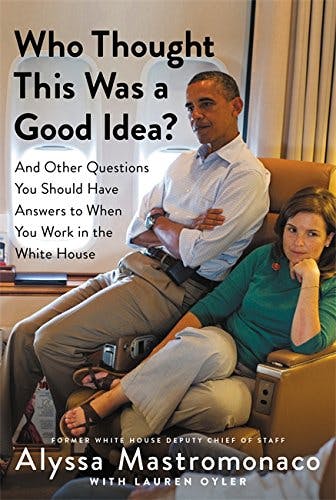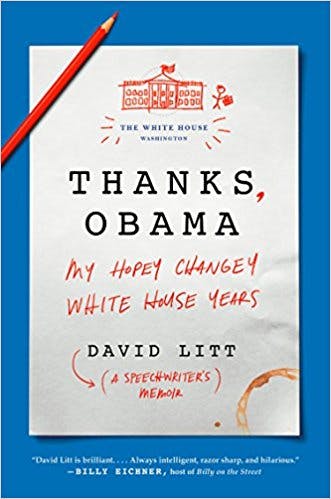Most political memoirs fall into a few categories. Some exist to build legacies by highlighting (and exaggerating) one’s role in history. Others are meant to settle scores, like former Defense Secretary Robert Gates’s case that everything was Barack Obama’s fault. Then there are those that seek to create the conditions by which a politician would ultimately write a book defining his legacy and getting back at his enemies. These are usually written by candidates, with the aim of introducing themselves to voters and hopefully making a bit of scratch along the way.
With very few exceptions—Barack Obama’s two memoirs, Al Franken’s recent Giant of the Senate—these books are awful. They’re usually too functional to be any good, too concerned with cementing a legacy or winning a race or making some money. They rarely form an actual part of one’s legacy, the way Obama’s memoirs partly define him as a writer. Hillary Clinton’s Hard Choices, for example, made the case that she should be the next president of the United States and also that she didn’t do Benghazi. What will be remembered about Jeff Flake’s recent Conscience of a Conservative is that a Republican senator fired a shot across the bow of the Trump administration—what won’t be remembered is anything about the book itself.
Two recent memoirs by Obama-era White House staffers—deputy chief of staff Alyssa Mastromonaco’s Who Thought This Was a Good Idea? and speechwriter David Litt’s Thanks, Obama—chart a different course. These are funny and self-deprecating tributes to an administration and a president that both authors deeply respect, not legacy builders or blueprints for the future. But in their very modesty—the most damaging detail in Mastromonaco’s book is that Obama once wore a mock turtleneck—they serve as a more devastating indictment of the current administration than a campaign-style book ever could.
Both books are cautious about laying blame and are abundant in graciousness, which may have something to do with the fact that both authors are young and have long careers ahead of them. But for the most part they mock the idea of leaving behind a legacy. Mastromonaco jokes her main contribution to American history was the introduction of a tampon dispenser in the White House bathroom. Litt takes a bit more credit, but mostly for similarly modest ends—Thanks, Obama is, for better and for worse, about what it was like being in the front row of the Obama White House’s most viral moments.
Mastromonaco and Litt play the role of what you call audience surrogates in television, offering an everyman look at what it’s like to work at the White House. At their best, these are anti-Game Change books, reminders that there’s more to politics than the Great Men and Women on camera, and all of the gossiping and backstabbing that goes on behind them. These are books about how the sausage of White House politics—speeches, schedules, interviews—is made.

Of course, one reason why that sausage isn’t written about very often is that it’s not always that interesting. Mastromonaco tries to transcend this by framing her book as a mix of self-help and comic memoir. She has a predilection for recounting embarrassing moments in historic locations—bleeding through her pants at the White House, nearly shitting her pants at the Vatican (she has IBS)—and her candor is what makes this a surprisingly good advice book. Yes, the usual banalities about being nice and organized are there, but they work because Mastromonaco gives so much of herself, and has clearly been there before.
Litt’s memoir is structured as a collection of speeches, with each chapter built on a central anecdote or metaphor. There are several that involve real people (or “RPs” as speechwriters apparently call them) who remind Litt of why he does what he does. It’s a clever meta-schtick, and he gets away with it because of the book’s greatest strength: its detailed and entertaining look at how presidential speeches are written.

But it also means that each chapter is dependent on the strength of its anecdotes. When they work—as they do in chapters about bucket lists and the Big Rock Candy Mountain—it’s a limber, funny and illuminating book. This is especially true near the end, when Litt reckons with the importance of public service, his boss’s legacy, and feeling like an old man in a young White House. (He’s 30 years old.) When they don’t—a chapter about finding a salmon fillet in the White House toilet—Litt’s overeager style can grate, giving the book the feel of a 300-page Shouts & Murmurs article. (The book’s appeal will depend on how much you care about the White House Correspondents Dinners, which were put out of their misery by Donald Trump, the only decent thing he’s done in office.)
Neither book tries to reckon with Obama’s legacy in anything less than true believer’s terms. They steer clear of the biggest blights on Obama’s record—the deportations and drones and Syria. But both gain poignancy from everything that’s happened since. The lack of scandal, the respect they have for their colleagues, and their larger sense of shared purpose to improve people’s lives does not always make for stirring reading. But it certainly stands in stark contrast to what is happening in the current White House.
There are times when these anecdotes—being underdressed at Buckingham Palace, getting caught in your underwear on Air Force One, getting a condolence call from the president after your cat dies—seem like small beer. Both books often read like commencement speeches (good ones, but still). But they’re both tributes to an administration that had its act together. The one moment both Mastromonaco and Litt single out as being monumentally disappointing was Obama’s disastrous first debate with Mitt Romney in the 2012 campaign, where it was clear that he didn’t come prepared. That was a massive blunder, sure. But would it make the top 25 of the first eight months of the Trump administration?
